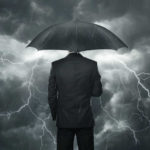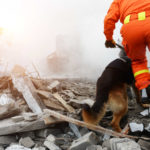As the Creator God, it should not surprise us to discover that God uses His creation to accomplish His will. Within the context of warning of pending judgment, Amos 4:13 reminds us that God is sovereign over creation, “For behold, he who forms the mountains and creates the wind, and declares to man what is his thought, who makes the morning darkness, and treads on the heights of the earth—the LORD, the God of hosts, is his name!” Similarly, the Psalmist notes in Psalm 18:11–14 that God wraps Himself in storm clouds as though they were His garment, and His voice is heard in thunderings, flashes of lightening, hailstones, and coals of fire.
In His sovereignty, God need not send disaster upon us. Rather, He may simply lift His hand of protection. In His love, God readily protects us from much of what may otherwise naturally occur. But we should not expect God to continually withhold such disaster when we are in rebellion to Him. At some point, He may choose to lift His hand of protection for a time, allowing nature to take its course as a means of challenging our rebellion and of reminding us of our reliance upon Him.
In lifting His hand of protection, sometimes God’s will is that evil deeds be judged. In Ezekiel chapter 13, God condemned Israel’s religious leaders who misled the people by pretending to speak for the Lord when they were truly speaking from their own desires. According to Ezekiel 13:11 and 13–14, God prophesied judgment, saying:
There will be a deluge of rain, and you, O great hailstones, will fall, and a stormy wind break out. … Therefore thus says the Lord GOD: I will make a stormy wind break out in my wrath, and there shall be a deluge of rain in my anger, and great hailstones in wrath to make a full end. And I will break down the wall that you have smeared with whitewash, and bring it down to the ground, so that its foundation will be laid bare. When it falls, you shall perish in the midst of it, and you shall know that I am the LORD.
God can, and has, used natural disasters to punish wickedness. Sometimes natural disasters are God’s means of reminding the world of His righteousness, justice, and sovereignty. Other times, God’s will is that people seek refuge from calamity by returning to Him in repentance and righteousness. In Amos chapter 4:6–10, God reveals how He used famine, drought, blight, and pestilence to alert the Israelites to the danger they were in due to their rebellion against God. His intent was not to punish sin, but to draw the people back to Himself. Nevertheless, Amos repeatedly laments, “yet you did not return to me, declares the LORD.”
C.S. Lewis said, “God whispers to us in our pleasures, speaks in our conscience, but shouts in our pain: it is his megaphone to rouse a deaf world.”1 Without the incentive of pain and discomfort, we as humans rarely feel the need to change our behavior. God knows that being in a right relationship with Himself is more important than temporary comfort, pleasures, or safety. As such, He sometimes allows tragedy to strike in a merciful attempt to reveal to us the peril of remaining in rebellion to Him.
It is difficult to witness the grief of losing loved ones to death, the breaking apart of families, and the suffering of children, and conclude that they may be experiencing God’s mercy. Nevertheless, this is the teaching of Amos. In fact, Amos 4:2–3 declares that because Israel failed to respond to the warnings that God sent using natural causes, the people would experience a severe judgment when foreigners conquered them and used meat hooks to drag many of them away into captivity.
Frightening as an encounter with the unbridled forces of nature may be, it is far less terrifying than a reckoning with He who controls the forces of nature. As such, God sometimes uses our helplessness in the face of His creation to remind us that we are not truly in control and that we are in great peril if we remain in rebellion to Him who is in control. Therefore, sometimes God uses natural disasters to teach people about His righteousness and their need to repent (Isa. 26:9).
This article is excerpted from the paper “Does God Use Natural Disasters to Judge People and Nations?“
Free Downloads
Share...
1. Rogers, Joshua. “What Did Jesus Say about Natural Disasters?” Fox News: Opinion, September 7, 2017. Accessed September 8, 2017. http://www.foxnews.com/opinion/2017/09/07/what-did-jesus-say-about-natural-disasters.html.
Unless otherwise noted, all Scripture quotations are taken from The Holy Bible, English Standard Version, copyright ©2001 by Crossway Bibles, a publishing ministry of Good News Publishers. Used by permission. All rights reserved.









